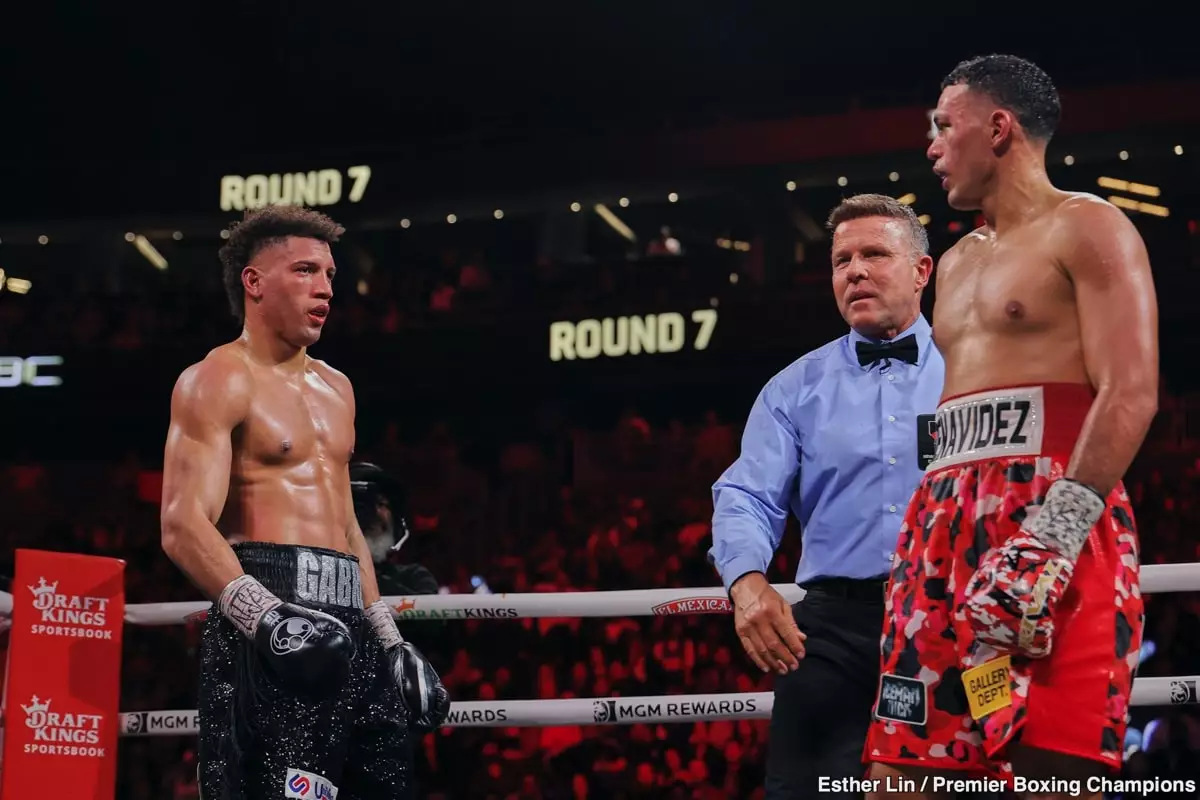In the world of professional boxing, narratives can significantly shape perceptions and opportunities. One narrative that has emerged recently is David Benavidez’s assertion that Canelo Alvarez avoids mentioning his name out of fear. Benavidez, an undefeated fighter with a furious punch, believes he poses the greatest challenge to Canelo— often referred to as one of the best pound-for-pound fighters in the sport. This assertion raises questions not only about Canelo’s strategic choices but also about the broader dynamics of power, risk, and business in boxing today.
Benavidez’s record speaks volumes. With 30 wins and 24 knockouts, he has proven himself a formidable opponent. His dismissal of the perception that Canelo is keen to fight Terence Crawford or others coming from lighter weights underlines a crucial point: the movement within boxing is increasingly driven by financial considerations rather than the pursuit of legacy. Benavidez contends that Alvarez’s decisions reflect a reluctance to embrace risk, a factor that could determine the future legacy of an athlete who has so far chosen the safer path.
The Business of Boxing: A Quest for Easy Fights?
By implying that Canelo favors smaller opponents or those perceived as less threatening, Benavidez broadly critiques the modern landscape of boxing where decisions are often dictated by potential profit margins over competitive spirit. “I feel like my name isn’t mentioned because I’m the most dangerous fighter out there,” he stated, laying bare the cold reality of prizefighting. The implication here is not merely that Canelo is avoiding him; it is that the sport itself is shifting towards matchmaking that emphasizes financial gains over the drama and excitement that make boxing thrilling.
As boxing becomes a more commercialized enterprise, mismatches and unchallenging fights risk alienating devoted fans. Canelo’s choice to fight Terence Crawford, an opponent who recently transitioned up from the welterweight division, speaks to this frustration. While Crawford is undeniably an exceptional fighter, the question arises—why engage in a contest that seems designed more for drawing viewers than truly testing a fighter’s mettle?
A Clash of Titans: The Fight Boxing Needs
Benavidez argues passionately that the best fight possible is the one against him, implying not only a clash of skill and power but also a spectacle that would ignite the excitement boxing desperately needs. “We’d give the fans a lot of fireworks in that fight,” he contends. Such a fight represents a chance for boxing to re-establish its heft and prestige—an invitation to witness the raw, untamed spirit of competition. Wouldn’t it be more exhilarating to watch Canelo embark on a daring challenge against an opponent like Benavidez rather than navigating safer waters?
The entrenched narratives surrounding both fighters suggest a polarizing reality in boxing fandom. Many aficionados are pining for the uphill battle, relishing the anticipation of gladiators coming to blows. Benavidez’s perspective calls upon Canelo to embrace the danger that comes with being at the top. By ducking challenges, even for reasons that may seem pragmatic—financial security or brand preservation—Canelo risks undermining the very essence of boxing, which thrives on conflict, passion, and the gritty journey of champions.
Legacy vs. Longevity: The Decisions That Shape the Future
David Benavidez’s remarks resonate with a sense of urgency that reflects the deeper issues at play in professional boxing today. He seeks to challenge the prevailing mindset that opts for easier fights in favor of a secure legacy, posing the question: at what cost is it to an athlete—and to the sport itself?
When fighters prioritize fewer risks, especially when they can yield larger financial rewards, the audience becomes the primary stakeholder to pay the price. It becomes a delicate balance—ensuring that while athletes strive for longevity, they do not sacrifice the essence of what makes them great.
As Benavidez aims to carve his path and force Canelo’s hand, he encapsulates a broader call to action. He urges boxers to confront challenges head-on for the sake of their fans and their sport’s integrity, rather than resorting to calculated matchmaking that diminishes the thrill and raw emotion boxing promises. The question lingers over the horizon: will Canelo embrace the challenge, or continue to sidestep the wild, unpredictable beauty that a fight with Benavidez could deliver?


Leave a Reply